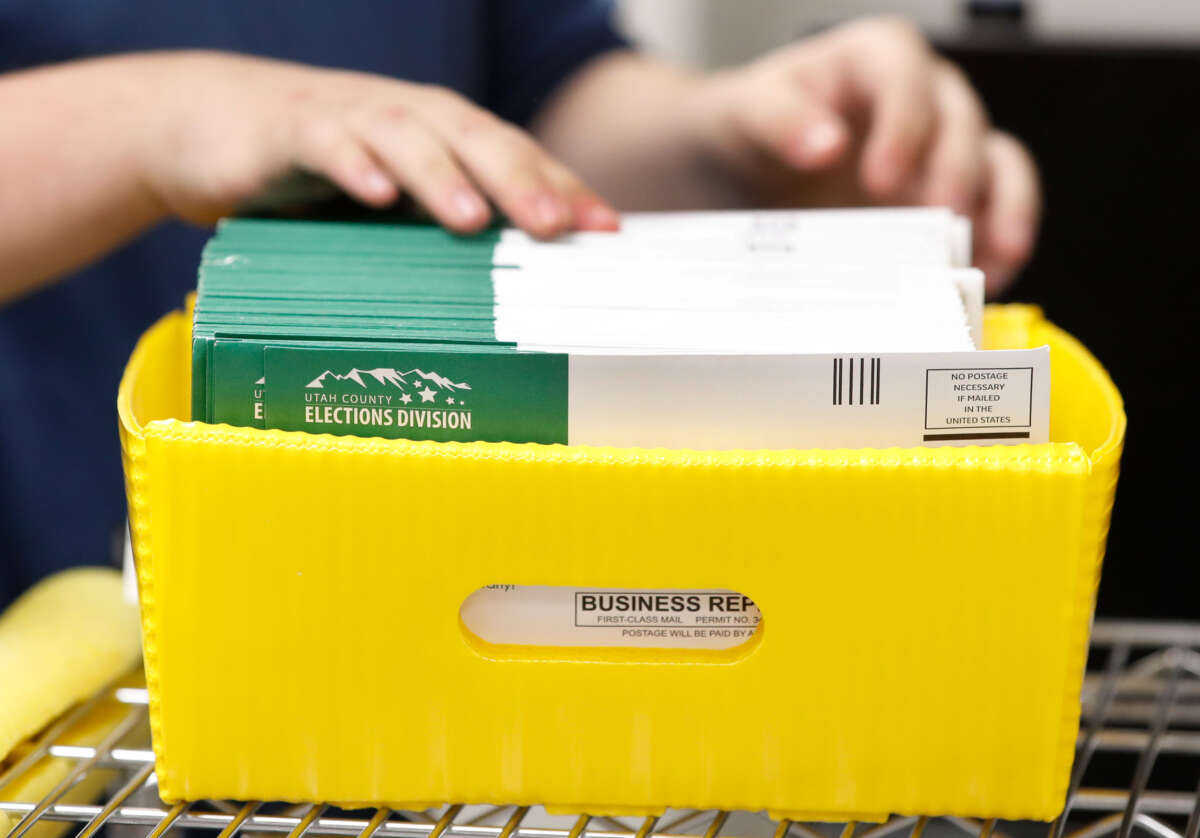Honest, paywall-free news is rare. Please support our boldly independent journalism with a donation of any size.
Utah state legislators are considering a bill that would change the state’s popular voting by mail system to require ballots received by mail to be dropped off at designated polling locations, a move that will likely disenfranchise the Native communities who live in rural areas.
Utah is notable for being one of two vote-by-mail states won by President Donald Trump in 2024. Residents in the state receive a ballot and then mail it back to be counted, giving the state a slightly higher rate in voter turnout than the U.S. average.
But unwarranted skepticism over voting by mail by Republican lawmakers has resulted in the crafting of House Bill 300, a measure that would effectively end the system and require an in-person method of voting instead.
Under the proposal authored by Republican State Rep. Jefferson Burton, residents would still have election ballots sent to them through the mail. However, the bill would require voters to physically return a ballot to a drop box or municipal building, both of which have to be staffed by poll workers who will be required to examine a person’s approved voter identification.
The bill advanced out of the House Government Operations Committee two weeks ago, amid objections from voting rights groups and Democratic legislators. It may receive consideration soon within the full House, although it is currently being negotiated further.
Voters could still send their completed ballots through the mail, but only if they opt-in to do so, and would be required to make that decision in person, too, at least 45 days prior to any election date. The decision to opt-in would also have to be renewed every two years.
The measure contradicts how Utahns feel about voting by mail — a 2022 Pew Research Center poll found that 90 percent of residents (including 88 percent of Republican voters) are “confident” or “very confident” that the current way elections are run is being conducted in a fair and accurate manner.
The bill is set to harm rural voters, most notably Navajo Nation members who live in areas far from what would be approved voting locations under the new bill. Many of those individuals lack the means to make such trips, meaning that the proposal, if enacted, would disenfranchise many within the Diné communities.
Utah was the last state in the U.S. to recognize the right of its Indigenous population to vote, only formally enacting a statute protecting that right in 1957. Even after that law was passed, other barriers to voting persisted, which voting rights advocates have sought to tackle ever since.
Diné member Tara Benally, a voting rights advocate, blasted the proposal.
“This is just another form of the Long Walk — being recognized as a citizen or being allowed to vote,” Benally said to The Salt Lake Tribune. “It’s that creation of distrust with the federal government that’s happening all over again, and those traumas being experienced all over again.”
Benally added:
We’ve had participation, but now having to take two steps back if they’re going to do away with the vote-by-mail, that just makes it harder for the people to really involve themselves in a system that has suppressed them.
During the committee hearing on the bill earlier this month, House Minority Leader Angela Romero questioned how the bill would protect voters’ rights, as its author had suggested that as the basis for crafting it.
“How are we going to work with people like the Navajo Nation, people that live far away from a polling place? How are we going to ensure that their votes are accounted for?” Romero asked.
In addition to likely hurting the voting rights of Native people in the state, the bill would also create barriers to another group of voters — people with disabilities. According to an assessment of 291 ballot drop boxes in the state, more than half are inaccessible to that group of people, as they are placed on high curbs, in places with uneven surface areas, or even inside buildings where there aren’t any ramps or accessible parking spaces.
More than one in four Utahns report having a disability.
“We know that requiring individuals to submit a ballot in person with ID in hand will disproportionately impact senior citizens, disabled veterans, the blind community and those living in care facilities,” said Nate Crippes, a public affairs attorney for Disability Law Center, during the committee hearing on the bill two weeks ago.
Media that fights fascism
Truthout is funded almost entirely by readers — that’s why we can speak truth to power and cut against the mainstream narrative. But independent journalists at Truthout face mounting political repression under Trump.
We rely on your support to survive McCarthyist censorship. Please make a tax-deductible one-time or monthly donation.
